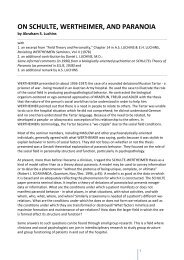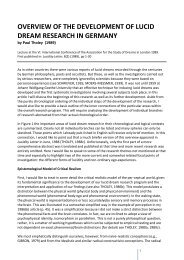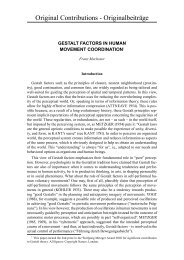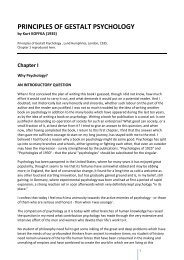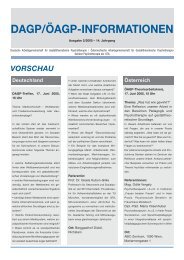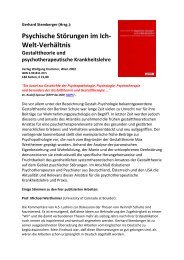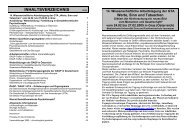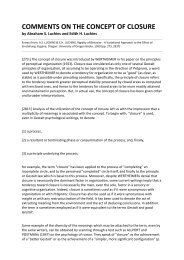Mary HENLE - Society for Gestalt Theory and its Applications (GTA)
Mary HENLE - Society for Gestalt Theory and its Applications (GTA)
Mary HENLE - Society for Gestalt Theory and its Applications (GTA)
- No tags were found...
You also want an ePaper? Increase the reach of your titles
YUMPU automatically turns print PDFs into web optimized ePapers that Google loves.
discrimination, practical concern' (1951/n.d.: 372n). What would seem to be a motor theory ofperception is, at times, assumed: 'The eyes <strong>and</strong> fingers cooperate in drawing outlines, so that theanimal learns to see more shapes <strong>and</strong> to differentiate objects in his field. By outlining onedifferentiates experience into objects' (1951/n.d.:312). In another place Perls suggests that 'westart with the impossible assumption that whatever we believe we see in another person or in theworld is nothing but a projection. Might be far out, but it's just unbelievable how much we project<strong>and</strong> how blind <strong>and</strong> deaf we are to what is really going on' (1969/1971:72). Although he does nothold with it completely, Perls seems to be saying that this assumption has something to it. Thestatement is less radical, but the meaning essentially unchanged, when he tells us that cathectedobjects become figure (1973:19). Once more, it is asserted that things-by which I assume hemeans phenomenal things - 'come about, more or less, by man's need <strong>for</strong> security'(1970/1973:20).It is difficult to discuss Perls' theory because we are not told on what the interest, attention, <strong>and</strong>cathexis are acting to produce percepts. lt is certainly not on organized entities, since they do theorganizing. Presumably, there<strong>for</strong>e, they are acting on sensory data. If this is the case, Perls'(partially implicit) theory is not only not <strong>Gestalt</strong> psychology; it is <strong>for</strong>mally similar to the theoriesthat <strong>Gestalt</strong> psychologists have criticized again <strong>and</strong> again, ever since Köhler's paper of 1913, 'OnUnnoticed Sensations <strong>and</strong> Errors of Judgment' (1913/1971). lndeed, Perls' theory, if it were spelledout, would seem to be very similar to those put <strong>for</strong>th by G. E. Müller <strong>and</strong> Eugenio Rignano in the1920s, both of which were criticized by Köhler. About such theories it may be said that neitherattention nor interest creates <strong>for</strong>m; rather, a <strong>for</strong>m must be perceived be<strong>for</strong>e it can be attended toor cathected. In both cases, the directional process presupposes the organization; the argument isthus circular. A similar problem arises if a motor theory is really meant: if visual organizationcomes from kinaesthesis, then that kinaesthetic organization remains to be explained. All thetheory has succeeded in doing has been to push the problem into another sensory modality.lt is not necessary, so far as I can see, that a theory of therapy include a theory of perception. Butif the author insists on such a theory, there are certain known pitfalls he would do well to avoid. Ifhe believes that his theory is a <strong>Gestalt</strong> theory, he would be well advised to look into what the<strong>Gestalt</strong> psychologists have to say.<strong>Gestalt</strong> psychology is most developed in perception <strong>and</strong> cognition, while gestalt therapy isconcerned with personality, psychopathology, <strong>and</strong> psychotherapy. Comparison of approaches tosuch different areas is often difficult. Nevertheless, in the present case, additional issues invitecomparison. As it happens, none of them is trivial.<strong>Gestalt</strong> psychology has, from <strong>its</strong> inception, been interested in value. Challenging the widely heldview of ethical relativism, the view that what is right <strong>and</strong> wrong changes with time <strong>and</strong> place, ithas tried to underst<strong>and</strong> values in terms of relations within happenings themselves. The value of anaction is seen as depending on <strong>its</strong> appropriateness to the dem<strong>and</strong>s of the given situation. Thus,<strong>Gestalt</strong> psychologists have held that values are not arbitrarily attached to objects or actions,depending on subjective evaluation or on the individual's history of rewards <strong>and</strong> punishments. Ananalogy of Wertheimer's will perhaps be helpful:Someone in adding makes seven plus seven equal fifteen. ... And he says, I call it good because I love the numberfifteen.... The determination of the fifteen is ... in violation of that which is dem<strong>and</strong>ed by the structure of the objectivesituation. If I prefer the fifteen in this case ... this is irrelevant to the fact that the fifteen is wrong. 1935:360-361)7



